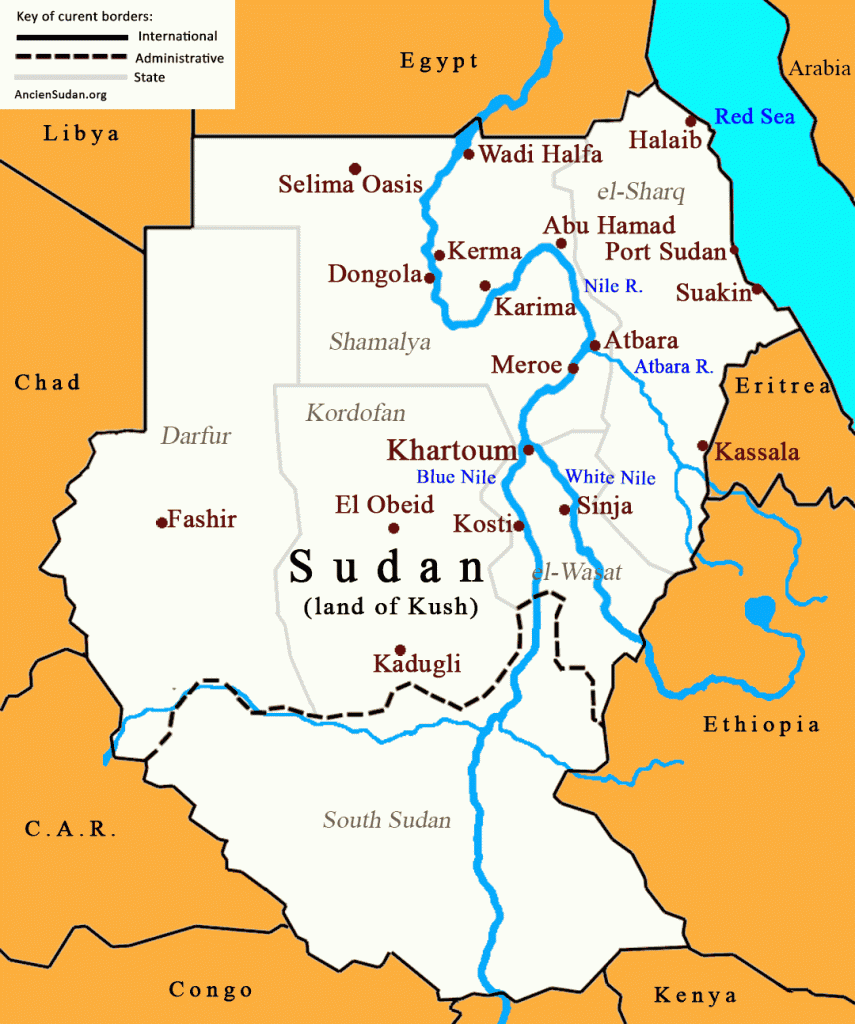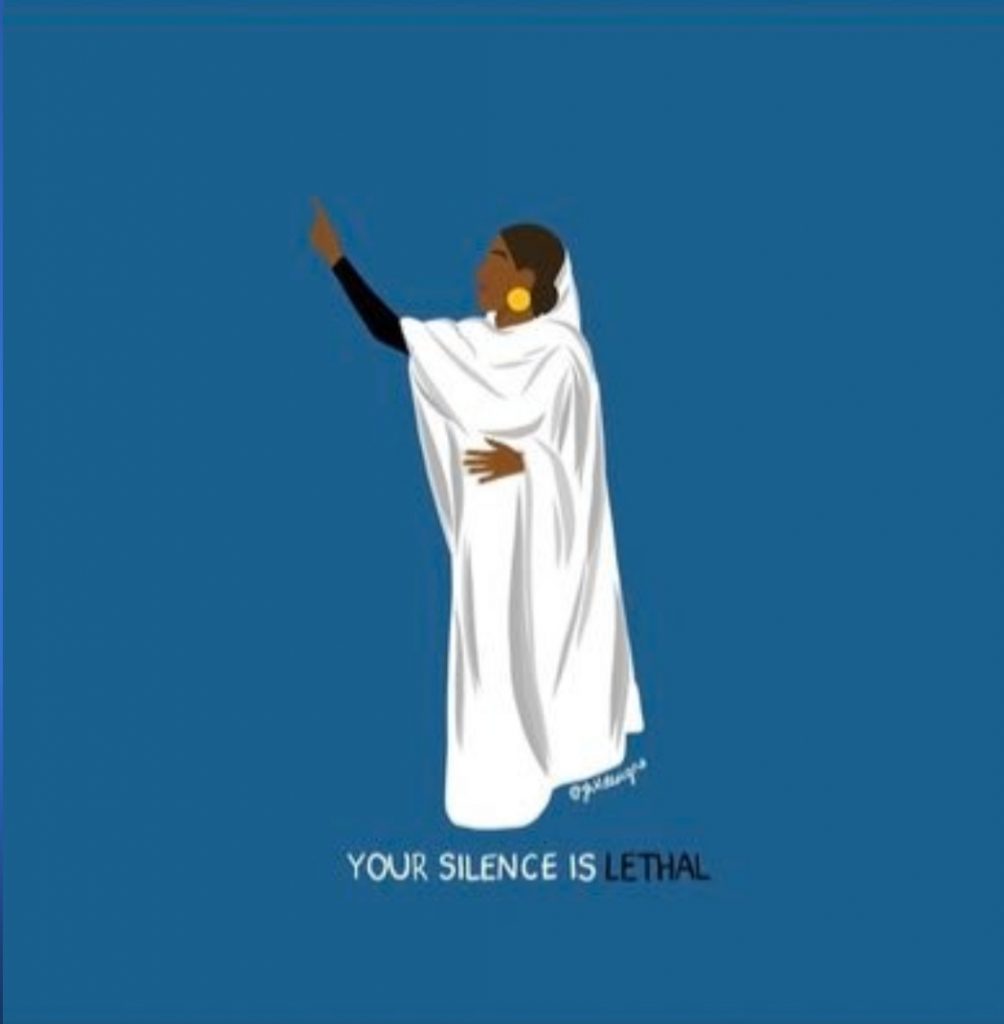Hajra Tahir
After a flurry of outrage on various social media platforms, the existence of the Sudanese Revolution has become common knowledge for many. Grotesque civil rights violations and extreme bouts of violence towards protesters was what initially instigated the movement; now colloquially renowned as ‘the blue wave’ as social media users are turning their avis blue. However, despite infiltrating the feeds of frequent Twitter, Facebook, Instagram and Snapchat users, the profound severity of the crisis has not yet registered with a large proportion of social media users who’ve conversely become more antagonized by the repetitive call to action.
Before deconstructing the origins and aims of ‘the blue wave’ and delving deeper into what differentiates the Sudanese Crisis from other human rights atrocities, the below videos summarise what is currently happening in Sudan as well as why and how the crisis came to fruition.
Sudan is situated in North-West Africa and shares a border with Egypt, Libya, the Central African Republic, Chad, Ethiopia and Eritrea. Prior to the crisis, it was the 110thlargest export economy in the world and exported roughly 55% of its natural resources to the UAE.

One of the most notable facts about the nation is that every 2 out of 3 people in Sudan are under the age of 25. The already populous country can therefore be seen to have an even more predominant youth subset population. Although such figures seem to be somewhat disconnected from the crux of the conflict, there is a pivotal link between the youth, social media and activism.
The below video illustrates the connection between these three variables.
The rejection of anachronistic regimes and values is an inherent characteristic of many young people and is often the driving force behind youth lead protests. The beatnik spirit of youngsters is often what perpetuates feelings of outrage and indignation – fuelling a sense of persistence during protests. Many would also suggest, notwithstanding criticisms of ‘snowflake’ hypersensitivity, that a pervading sense of altruism amongst the new generation of millennials is also an integral factor that has led to their involvement in political matters. Youth lead movements and values are becoming more prevalent as evidenced by the emergence of strong, younger political representatives such as congresswomen Alexandria Ocasio Cortez in the US – often displacing older candidates who have an entrenched legacy in certain districts.
They can also be seen to be taking centre stage when addressing wider socio-political issues such as climate change – as demonstrated by 16-year-old Greta Thunberg, who began protesting for immediate action regarding climate change outside the Swedish Parliament before going on to recently speak at the UN Climate Change conference.
Therefore, considering the affinity the youth has for democratic values and activism along with Sudan’s overtly young population, we can make the presumption that the majority of protestors are amongst the youth. The crowds gathered in Khartoum can also be seen to harbour a notably large proportion of female protestors – the most distinct being 22-year-old Alaa Salah – the woman in white.
The Woman in White
An embodiment of the feminist movement, the youth and all that the Sudanese revolution stands for, Alaa took social media by storm and soon became the emblem of the revolution.

By encapsulating the relationship between the youth, activism and the relevance and immense power of social media, the young mutineer reflects the ethos behind the blue wave and what it aims to prevent – silence. The critical purpose of the movement is therefore to spread awareness – to use digital platforms to mitigate other inhibitions such as power shortages and nationwide internet blockades. Propelled by the youth, within Sudan as well as outside, the masses of ‘blue’ social media users have acted as a call to action and a symbol of unity. A plethora of celebrities and well-known public figures have pledged solidarity with the Sudanese people, creating a stronghold of supporters with a range of connections and wealth, including Rihanna, Naomi Campbell, Cardi B and Bella Hadid amongst many others.
However, the initial question has not been addressed: what is so special about Sudan, the ‘blue wave’ and what differentiates it from other humanitarian crisis’?

The above image exhibits how the clout generated by the blue wave will ultimately render attempts to disclose the actions of the Sudanese military and their ventures to strengthen their arsenal and international connections, futile. By making the basic framework of the crisis’ origins commonplace, efforts to conceal evidence of murder will not succeed in manipulating the people.
The unique nature of the Sudanese crisis therefore lies in this integral detail – by educating the masses, legal intervention on behalf of the RSF becomes increasingly fruitless – action to legitimise the massacre as was done in other war-torn nations such as Syria and Palestine, will fail. The future of the nation therefore hinges upon the initiative of the younger generation who are aiming to ‘popularise’ the events of the uprising. It can therefore be seen that, for the many sceptics and not-so-innocent bystanders, the ‘blue wave’ movement is not all useless, nor is it a way to appear ‘woke’ – it is a powerful tool that can be utilised to undermine impending efforts to legitimise genocide and massacre.
Sudan is unlike any humanitarian crisis we have encountered. It shares various characteristics with many other crises of a similar nature (Syria and Palestine) such as the immense dynamism and initiative shown by the youth and a prominent digital presence.

However, unlike those aforementioned, Sudan is in the early stages of its suffering. By not trivialising the actions of those on social media and continuing to utilise the digital space and the efforts of those who use it the most (the youth), we can ease the situation and help those suffering. This is why Sudan is so special and why the ‘blue wave’ is a movement worth participating in.
Hajra is in the first year of her undergraduate Law with Politics degree at the University of Manchester. With an interest in international relations, literature and travelling she aims to hopefully supplement her future career as a city lawyer with pro-bono work and an involvement in civil and human rights.


